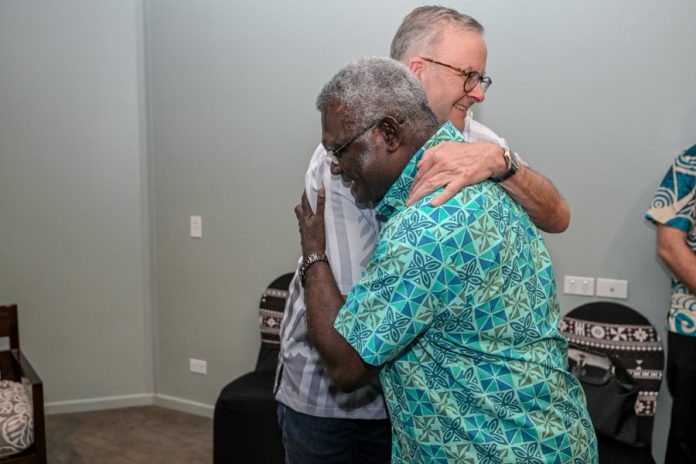Australian Prime Minister Anthony Albanese and his Solomon Islands counterpart have hugged and greeted each other warmly while meeting face to face for the first time on the sidelines of the Pacific Islands Forum (PIF) in Fiji.
Tensions between Australia and Solomon Islands have intensified in the wake of Honiara’s decision to strike a contentious security pact with China.
But the initial exchange between the two leaders showed positive signs the countries could smooth their increasingly strained relationship.
“Ahhh, I need a hug!” Prime Minister Manasseh Sogavare said as the pair embraced.
“It’s good to meet you and thank you for the discussion we’ve had on the phone about our common interests,” Albanese told Sogavare.
“The relationship between us is very important and there’s much more we can do to cooperate and develop those relationships of trust.”
Sogavare said Solomon Islands and Australia had been friends even before independence.
“We are family and there are many issues, and that makes family stronger,” Sogavare said.
Details of the pact with China have not been disclosed, but Sogavare has ruled out allowing Beijing to have a military base in Solomon Islands.
When questioned on the issue earlier in the day, Albanese would not say whether he would press his counterpart on the pact.
He said he would aim to have an honest discussion.
“And that means not necessarily agreeing with each other the whole time, but it means being able to have an open dialogue,” he said.
Albanese arrived in the Fijian capital on Wednesday saying he wanted to bring “positive energy” to the Forum to help heal divisions which threaten the unity of the peak regional body.
He also welcomed the Biden administration’s promise to ramp up its diplomatic engagement in the region.
The meeting of foreign leaders in Suva has been overshadowed by internal divisions after Kiribati announced it would quit the forum.
The controversy has its roots in a complex dispute over leadership, but the opposition in Kiribati has accused China of driving the decision.
Albanese would not be drawn on the cause of the split when asked about it in Suva, saying he wanted to focus on how to heal the rift.
“What I want to do and what I bring to this Forum is a positive energy, and I’ll be doing all that I can to bring all of the nations who are members of the Pacific Forum together,” he told reporters.
Several Micronesian leaders have been trying to reach the President of Kiribati, Taneti Maamau, but so far he has refused to return calls.
Albanese arrived in Fiji after US Vice-President Kamala Harris laid out a suite of new measures to boost America’s presence in the region, telling Pacific Island leaders this morning the region had not always “received the diplomatic attention and support that you deserve”.
She also warned that nations in the Pacific must be “free from aggression or coercion” in a clear reference to China.
“At a time when we see bad actors seeking to undermine the rules-based order, we must stand united,” she told the forum.
“We must remind ourselves that [by] upholding a system of laws, institutions, and common understandings, this is how we ensure stability and indeed prosperity around the world.”
Albanese also praised the new announcements from the Biden administration, saying it would “renew” the U.S commitment to the region.
Former Kiribati president Anote Tong told The Drum he was surprised by Kiribati’s withdrawal from the Pacific Islands Forum.
“It’s unheard of,” he said.
“In the entire history of the Forum, I don’t recall any country withdrawing.”
But he said his country would welcome the U.S Vice-President’s announcement the US would open two new embassies in the region – including one in Kiribati – and appoint its first-ever envoy to the Pacific.
“An embassy in Kiribati is something that we have always been asking for,” Tong said.
“It would be very unusual that President Taneti Maamau will not accept this, and I think there would be very strong public opinion to have one.”
Research fellow and director of the Pacific Institute at ANU, George Carter, is also confident that Pacific leaders will find a way to re-engage with the current Kiribati President.
“Just like the Micronesian exit, when it was announced a year ago, there was a pathway in which leaders reached out,” Carter told The Drum.
“That’s part of Pacific regionalism and what we call the Pacific family.
“There will be an avenue to bring President Maamau back to the fold, and hopefully we will see this unveiled when the leaders come out of the retreat,” he said.
SOURCE: ABC/PACNEWS













